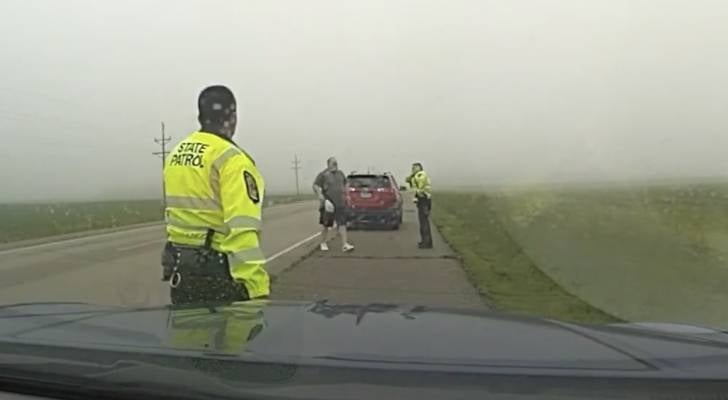
A shocking crash involving a rookie Minnesota state trooper has left a family reeling.
The incident happened last June along Highway 23, near Marshall, Minnesota.
Jamie Krueger was driving behind a State Patrol trooper when, without warning or flashing lights, the officer attempted a sudden U-turn to chase a speeding driver. He hit Krueger’s car and the impact sent the vehicle swerving off the road.
While the Kruegers were treated for minor injuries, their car was deemed a total loss and Krueger was left to cover the $1,000 deductible.
The shocker? The Minnesota Department of Administration refused to cover the costs, citing “immunity” — a legal shield protecting government workers from liability.
Don’t miss
- I’m 49 years old and have nothing saved for retirement — what should I do? Don’t panic. Here are 5 of the easiest ways you can catch up (and fast)
- Car insurance in America now costs a stunning $2,329/year on average — here’s how 2 minutes can save you more than $600 in 2025
- Gain potential quarterly income through this $1B private real estate fund — even if you’re not a millionaire. Here’s how to get started with as little as $10
“We see that a lot with immunity cases”
After months of back-and-forth, the state refused to pay, sending Krueger a letter saying, “We are unable to consider your claim for payment,” and citing “immunity.”
Dashcam footage from the crash shows the moment of impact, followed by a senior trooper admitting the rookie officer, "didn’t see you." That statement and the accident report’s mention of an “improper turn or merge” seemed to confirm that the trooper was at fault.
Legal experts like Alicia Granse, an attorney with the ACLU of Minnesota, are worried that this could set a dangerous precedent. Granse argues that while immunity shields government workers, it shouldn’t prevent them from acknowledging harm and making things right.
“We see that a lot with immunity cases,” she said. “It’s very difficult to hold government agents accountable in any sphere.
In recent years, the ACLU has made it a priority to challenge immunity laws, hoping to reduce how often the government uses these legal defenses.
She added, “We don’t want to penalize, necessarily, government agents who make a mistake, but they should at least acknowledge the harm and try to make things right.”
According to ABC News, the Minnesota Department of Administration declined to comment and the State Patrol, which confirmed the rookie officer left the force just two weeks after the crash, also refused to provide further details. The records show that the officer was not cited.
Read more: Want an extra $1,300,000 when you retire? Dave Ramsey says this 7-step plan ‘works every single time’ to kill debt, get rich in America — and that ‘anyone’ can do it
What to do if your insurance claim is denied
Dealing with a denied insurance claim can be frustrating, but here are some steps you can take to navigate the tricky situation.
To begin with, it’s important to understand your policy, keep good documentation and stay current on payments to avoid any issues in the first place.
Each state has its own rules for handling insurance claim denials and appeals. Reach out to your state’s insurance department for advice.
If your claim does get denied, make sure you understand why by reviewing the insurer’s Explanation of Benefits (EOB). Common reasons for denial include missing documentation, failure to meet policy terms, or expired policies. If you believe the denial was incorrect, you can file an appeal with the insurer and be sure to submit all necessary documentation and stick to deadlines.
If your appeal isn’t successful, consider mediation or arbitration to resolve the issue more quickly and affordably. You also have legal rights, with each state offering regulations for handling claims disputes. Federal protections like ERISA apply to employer-sponsored health plans.
If necessary, you can consider escalating the issue to a regulatory body such as the Consumer Financial Protection Bureau or seeking legal action. Seek professional advice to help guide you through the appeals process and ensure your claims are handled correctly.
Krueger, for his part, is just looking for one thing: “I’m not looking for a lottery ticket here. I’m looking for accountability. I’m looking for the right thing to be done,” he said.
What to read next
- Accredited investors can now buy into this $22 trillion asset class once reserved for elites – and become the landlord of Walmart, Whole Foods or Kroger without lifting a finger. Here’s how
- Here are 3 ‘must have’ items that Americans (almost) always overpay for — and very quickly regret. How many are hurting you?
- Nearly 1 million Americans have a net worth of at least $10,000,000 — here are 3 ‘quiet’ ways the ultra-wealthy grow their riches (and how you can join the club ASAP)
This article provides information only and should not be construed as advice. It is provided without warranty of any kind.